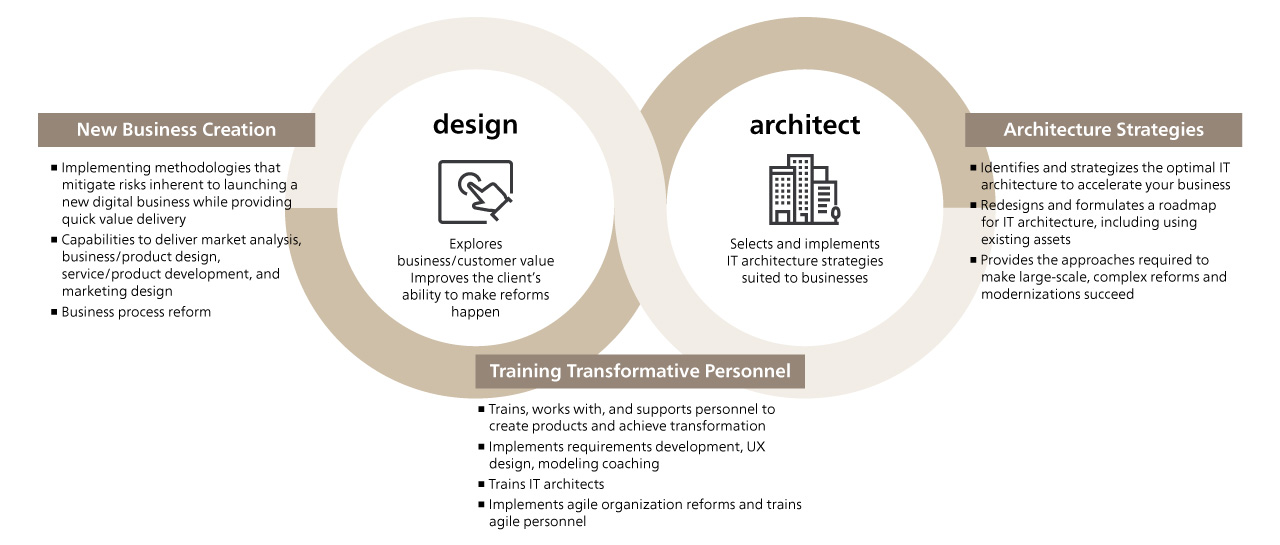A team of design and architecture experts with knowledge of business and digital technologies help their clients provide new value and evolve as a company by uniting with technology
Design & Architecture
Service
Companies must sustain providing new value quickly to meet evolving customer needs. Companies must continuously identify potential needs and leverage their corporate capabilities and technologies to survive. They must continue to provide value quickly to meet the needs of their customers.
ABeam Consulting’s team of design and architecture experts knowledgeable in business and digital technologies can identify where value can be provided, choose the very best co-creation companies and technologies, formulate the best possible architecture, collaborate with companies and organizations with different cultures, and improve the client’s agility to quickly deliver value. They can continuously support the creation of the new values required for companies to meet the needs of their customers.
-
Insight
Improving Business Agility and Providing Continuous Value
-
Case Study
Nagase Vietnam Company Limited:Driving Digital Excellence: Re-foster back-office activities by implementation of RPA/DX Center of Excellence (CoE) for Nagase Vietnam
-
Insight
SaaS Revenue Diversification Strategy as Part of Digital Business Transformation ~The Risks and Opportunities of Introducing an Advertising Model~
Trends/Challenges
Business establishment made difficult by the evolution of digital technology
The evolution of digital technology in a turbulent era has disrupted mature businesses and preconceived ideas. Companies must create new businesses with digital technology, striving for sustainable progress and competitive dominance while remaining agile and adaptable, unbound by existing business models and frameworks. In today’s commoditized world, creating a new business is not an easy feat. There are many considerations towards the essential value of a new business.
Companies must define their markets and customers and the value they provide with digital technology in terms of the scenario, story, and use cases, and clarify the significance and value of the business to the company. Advanced project and risk management is required under time, budgets, and personnel constraints, and companies must also understand and utilize the characteristics of digital and architecture to provide sustainable value in stages.
It is essential to build organizations to shape services and products, ensure effective marketing, and to continue the success of the business. New businesses are not guaranteed to succeed unless companies consider what they will sell and how they will sell it, including the formation of an effective sales team.
Businesses can only join the race once they are up and running. Meanwhile, creating digital businesses requires many simultaneous considerations. It is difficult for companies to get started all by themselves and make it to the starting line.

The uncertainties of IT architecture brought about by the lack of a proactive IT team
The world becoming more globalized and digital technology more prominent. We are rapidly moving into an age where business can be conducted by companies all over the world exchanging information. In these times, small, distant actions can form a tsunami of change. Companies must act swiftly to avoid potential issues.
Japanese companies still bear the system and technical liabilities from yesteryear, and upgrading legacy systems is a pressing issue. This is known as “the 2027 Problem,” named so because standard support for certain SAP products is scheduled to end in 2027. Many competitors are adopting a shotgun approach to modernization, and many companies taking a reactive stance rather than aligning with their strategic objectives. This backward-looking response is holding back corporate strategies.
The issue here is that companies are not integrating proactive IT strategies with corporate strategies. They have no plan, philosophy, or a projected future for information systems. The term “enterprise architecture” has become commonplace and efforts have been made to optimize companies. The problem is partly down to the difficulty of generating positive results for those companies.
Businesses cannot exist without digital technology. The companies of tomorrow must establish a proactive IT team that is not merely a cost center. They must push their planning forward and bring those plans to fruition.

Breaking free from 'fake agile' that slows down business reforms
Companies face a technological revolution and a rapidly-changing business environment. Swift business reforms are required for companies to meet these needs and standards.
IT is the backbone of organizations, individuals, and businesses. It enhances the agility required for business operations, which is why companies set up agile organizations and apply agile frameworks (e.g. Scrum) to projects. However, companies have been unable to change the long-standing relationships and culture between the business side, which makes demands, and the IT side, which receives and implements those demands. Transformation projects are also stuck using a high-risk approach where the business side defines the requirements and delegates the work to an IT department or vendor. They perform checks just before going live at the end of the project, which creates a situation where project objectives cannot be achieved within limited budgets and deadlines.
The “Agile Manifesto” set forth the principles for successfully adapting to meet customer needs with digital technology. Companies must make a drastic switch to a project approach that makes it easier to meet customer needs and makes it possible to reduce transformation risks by changing the culture of the organization and the awareness of the people involved.
Companies and organizations must shift to the ‘Be Agile’ approach highlighted in the “Agile Manifesto,” with principles such as continuously understanding changes in customer value, collaborating with business and digital experts beyond the boundaries of companies and organizations, establishing a resilient architecture and design capable of withstanding change, having approaches on hand ready for changing risks, re-using digital technology, and leveraging AI, solutions, and advanced project approaches to quickly inject quality. In addition, companies must secure and train personnel capable of taking on new approaches, accepting the diverse cultures between companies and organizations, and the personnel who possess expertise in both business and digital technologies.

Where ABeam Stands Out
-
Next-generation value approaches and new business development
ABeam Consulting uses exclusive approaches to generate the value necessary for its client’s success in the years to come. ABeam Consulting emphasizes deep market insights and advanced technology integration, bringing to life sustainable and competitive services.
-
Selecting and implementing IT architecture strategies suited to businesses
ABeam Consulting emphasizes integrating technology and business models when proposing strategic IT reforms to establish a sustainable competitive edge. ABeam Consulting supports their clients in growing its business, leading to sustainable success.
-
Insights that produce greater business agility
ABeam Consulting draws upon its exclusive processes and state-of-the-art tools to select the best possible approach that helps its clients adapt quickly to the changing business environment and establish a sustainable competitive edge. ABeam Consulting shapes a future vision for its clients and facilitates industry-leading reforms.
Services Provided
Design and architecture experts knowledgeable about business and digital will help train/launch individuals/organizations to create new businesses, form an IT architecture strategy to accelerate those businesses, and enhance the client’s ability to put strategies into practice.

Digital Business Creation
Click here for inquiries and consultations
